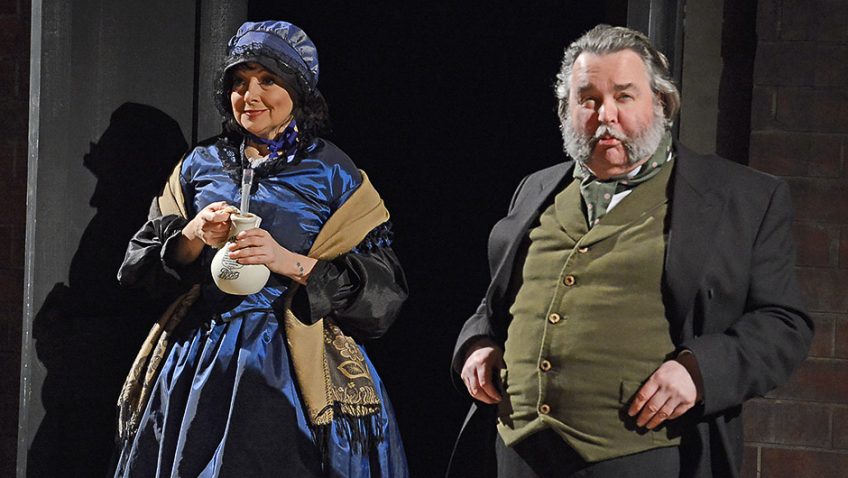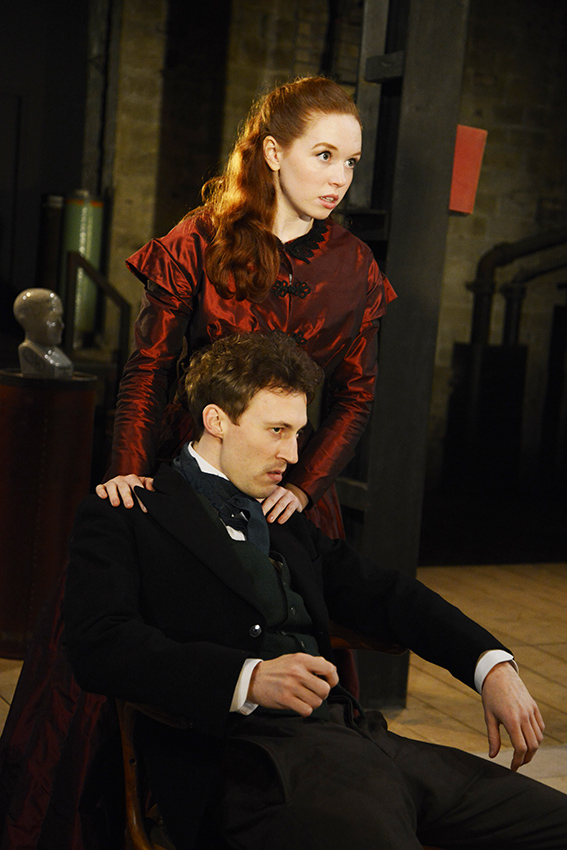Eileen Caiger Gray reviews Hard Times at West Yorkshire Playhouse (May 24th 2018)
Eee, it’s grim Up North in Victorian England! But, thanks to Northern Broadsides’ balance of the grim, serious and tragic with the humorous, colourful and tuneful, Deborah McAndrews’ adaptation of Hard Times is an uplifting entertainment, the comings and goings of Dickens’ motley crew of Sleary’s Circus folk providing great scope for regular bursts of riotous cavorting and fine musicianship, all courtesy of a multi-talented cast.
Dickens usually, of course, was exposing the plight of the impoverished, exploited classes down south, but after brief visits to Birmingham and Preston, in 1854 he set Hard Times, his shortest novel, in the industrial powerhouse of the North. Fictional mill-town, Coketown, evoked onstage by means of simple red brick walls and grey wood, has additional grimness thrust upon it by wealthy Mr Gradgrind. In his school and likewise his family, he allows no music, no arts, no corrupting story books. His strict Utilitarian philosophy rules: creativity, imagination and sentiment are all out because facts, figures, statistics and logical reasoning are the be all and end all (just as in Jonathan Lewis’ brand new play, and equally relevant today.) So how will life turn out for daughter Louisa and son Tom in this repressed, joyless environment?
Star of hilarity is grotesque, dark, Satanic mill owner and banker Mr Josiah Bounderby of Coketown, played to glorious effect by Howard Chadwick. If there’s a Brian Blessed Big Voice Competition or Steve Pemberton League of Comic-but-Creepily-Menacing-Gentlemen Award, he’s in the running – and he’s a fine Ronnie Barker of a trumpet/cornet-playing strongman into the bargain. Bounderby, big-bodied, blustering blunderbuss of a boaster and fraud, is outspoken, brash and bombastic, his outward joviality barely covering a lurking menace of gross inhumanity. But this callous bully of a self-made man has everyone laughing and gasping throughout, taking a melodramatic step too far only right at the end when scrappy plotline and unconvincing, unwieldy denouements don’t quite know what to do with themselves in this less well-rounded of Dickens’ works.
There’s touching poignancy, though, in the story of down-trodden, destitute Stephen Blackpool (Anthony Hunt) and his beloved Rachael (Victoria Brazier), characters more realistic and less the typically exaggerated Dickens’ caricatures, who bring home the plight of the exploited, powerless poor. Though he steadfastly refuses to join his fellow weavers’ Union (unions not being favoured by Dickens himself), Stephen, like Rachael but unlike the wealthy capitalists, career politicians and self-serving entrepreneurs around him, is utterly loyal, honest and full of moral integrity. So he’s doomed, of course, to a sudden unjust and tragic end. Tugging at heartstrings, too, is sparky, lively, caring Sissy (Suzanne Ahmet) when, torn from the freedom, warmth and joy of her circus days, she loses her father as she enters the stiff coldness of the Gradgrind school and household.
The dangerous, destructive effects of Gradgrind’s straitjacket upbringing spells disaster in different ways for his son and daughter and their mental well-being. Poor, repressed, subdued Louisa (Vanessa Schofield), less of a caricature than her wheezy, head-ache prone mother or the two eccentric old ladies, Mrs Sparsit and Mrs Pegler, knows the world has far more to offer than facts and figures. She longs for what she’s missing, but, with no idea where to find it, ends up sacrificing her own happiness, while brother Tom goes off the rails in more dissolute directions.
Some characters are more weakly portrayed than they might be, but, in this highly enjoyable production, Dickens’ messages come through strong and clear, namely that we exclude life-affirming creativity at our peril, for it creates compassion and understanding in humans, as well as well-being and joy, and that those of power and wealth should be so morally sound they commit themselves wholeheartedly to creating justice throughout all of society. Flying pigs, however, do not feature.





